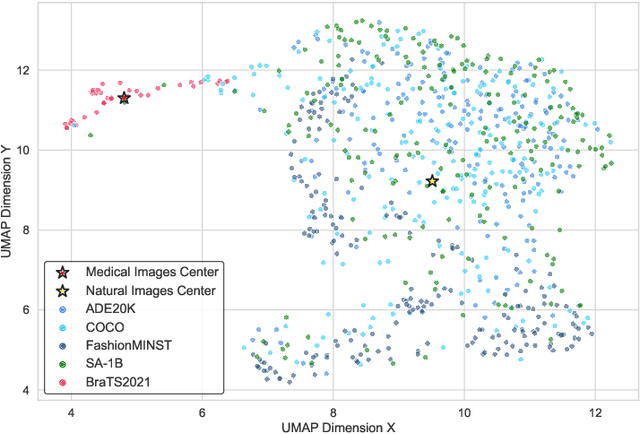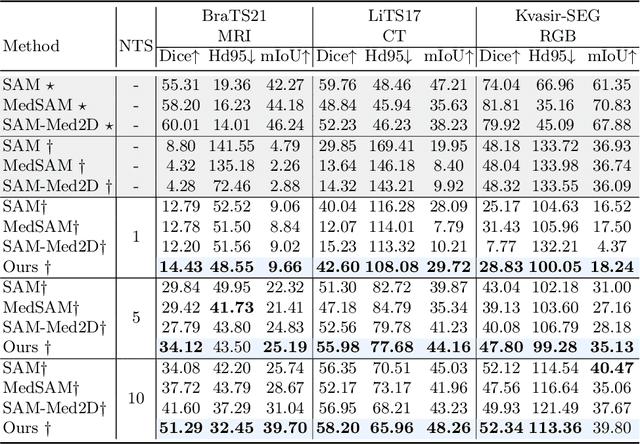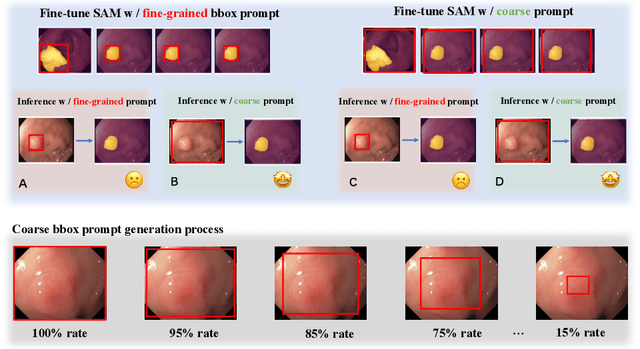Jiangxing Wu
Few Exemplar-Based General Medical Image Segmentation via Domain-Aware Selective Adaptation
Oct 11, 2024



Abstract:Medical image segmentation poses challenges due to domain gaps, data modality variations, and dependency on domain knowledge or experts, especially for low- and middle-income countries (LMICs). Whereas for humans, given a few exemplars (with corresponding labels), we are able to segment different medical images even without exten-sive domain-specific clinical training. In addition, current SAM-based medical segmentation models use fine-grained visual prompts, such as the bounding rectangle generated from manually annotated target segmentation mask, as the bounding box (bbox) prompt during the testing phase. However, in actual clinical scenarios, no such precise prior knowledge is available. Our experimental results also reveal that previous models nearly fail to predict when given coarser bbox prompts. Considering these issues, in this paper, we introduce a domain-aware selective adaptation approach to adapt the general knowledge learned from a large model trained with natural images to the corresponding medical domains/modalities, with access to only a few (e.g. less than 5) exemplars. Our method mitigates the aforementioned limitations, providing an efficient and LMICs-friendly solution. Extensive experimental analysis showcases the effectiveness of our approach, offering potential advancements in healthcare diagnostics and clinical applications in LMICs.
Intelligent Computing: The Latest Advances, Challenges and Future
Nov 21, 2022Abstract:Computing is a critical driving force in the development of human civilization. In recent years, we have witnessed the emergence of intelligent computing, a new computing paradigm that is reshaping traditional computing and promoting digital revolution in the era of big data, artificial intelligence and internet-of-things with new computing theories, architectures, methods, systems, and applications. Intelligent computing has greatly broadened the scope of computing, extending it from traditional computing on data to increasingly diverse computing paradigms such as perceptual intelligence, cognitive intelligence, autonomous intelligence, and human-computer fusion intelligence. Intelligence and computing have undergone paths of different evolution and development for a long time but have become increasingly intertwined in recent years: intelligent computing is not only intelligence-oriented but also intelligence-driven. Such cross-fertilization has prompted the emergence and rapid advancement of intelligent computing. Intelligent computing is still in its infancy and an abundance of innovations in the theories, systems, and applications of intelligent computing are expected to occur soon. We present the first comprehensive survey of literature on intelligent computing, covering its theory fundamentals, the technological fusion of intelligence and computing, important applications, challenges, and future perspectives. We believe that this survey is highly timely and will provide a comprehensive reference and cast valuable insights into intelligent computing for academic and industrial researchers and practitioners.
 Add to Chrome
Add to Chrome Add to Firefox
Add to Firefox Add to Edge
Add to Edge